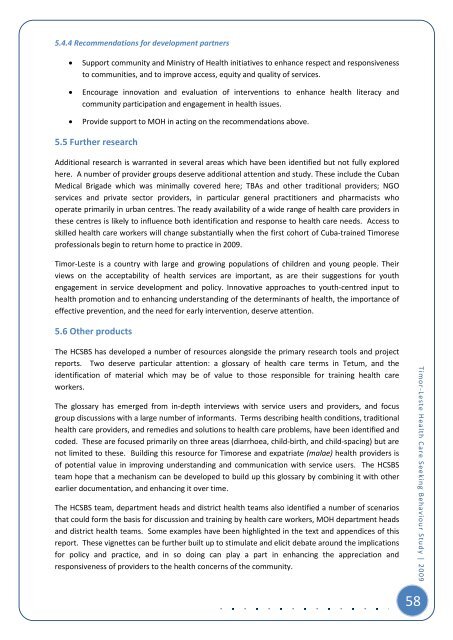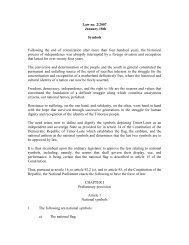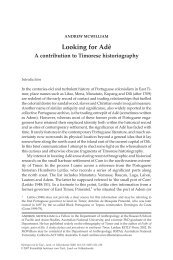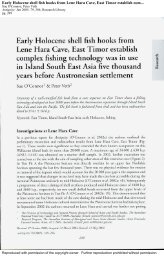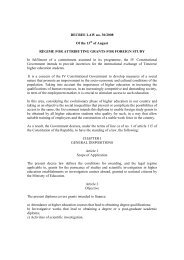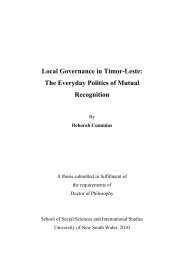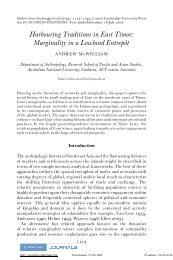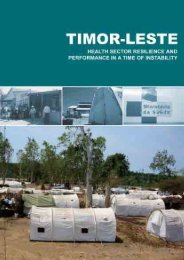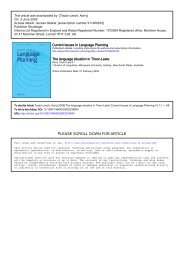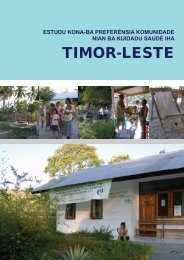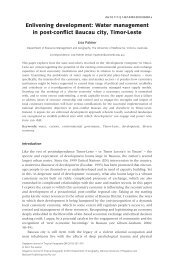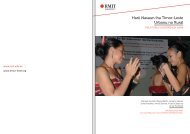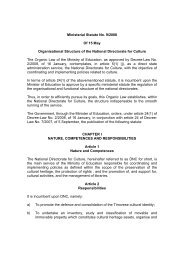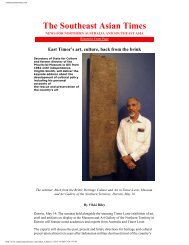Timor-Leste Health Care Seeking Behaviour Study - Secretaria de ...
Timor-Leste Health Care Seeking Behaviour Study - Secretaria de ...
Timor-Leste Health Care Seeking Behaviour Study - Secretaria de ...
- No tags were found...
Create successful ePaper yourself
Turn your PDF publications into a flip-book with our unique Google optimized e-Paper software.
5.4.4 Recommendations for <strong>de</strong>velopment partners• Support community and Ministry of <strong>Health</strong> initiatives to enhance respect and responsivenessto communities, and to improve access, equity and quality of services.• Encourage innovation and evaluation of interventions to enhance health literacy andcommunity participation and engagement in health issues.• Provi<strong>de</strong> support to MOH in acting on the recommendations above.5.5 Further researchAdditional research is warranted in several areas which have been i<strong>de</strong>ntified but not fully exploredhere. A number of provi<strong>de</strong>r groups <strong>de</strong>serve additional attention and study. These inclu<strong>de</strong> the CubanMedical Briga<strong>de</strong> which was minimally covered here; TBAs and other traditional provi<strong>de</strong>rs; NGOservices and private sector provi<strong>de</strong>rs, in particular general practitioners and pharmacists whooperate primarily in urban centres. The ready availability of a wi<strong>de</strong> range of health care provi<strong>de</strong>rs inthese centres is likely to influence both i<strong>de</strong>ntification and response to health care needs. Access toskilled health care workers will change substantially when the first cohort of Cuba-trained <strong>Timor</strong>eseprofessionals begin to return home to practice in 2009.<strong>Timor</strong>-<strong>Leste</strong> is a country with large and growing populations of children and young people. Theirviews on the acceptability of health services are important, as are their suggestions for youthengagement in service <strong>de</strong>velopment and policy. Innovative approaches to youth-centred input tohealth promotion and to enhancing un<strong>de</strong>rstanding of the <strong>de</strong>terminants of health, the importance ofeffective prevention, and the need for early intervention, <strong>de</strong>serve attention.5.6 Other productsThe HCSBS has <strong>de</strong>veloped a number of resources alongsi<strong>de</strong> the primary research tools and projectreports. Two <strong>de</strong>serve particular attention: a glossary of health care terms in Tetum, and thei<strong>de</strong>ntification of material which may be of value to those responsible for training health careworkers.The glossary has emerged from in-<strong>de</strong>pth interviews with service users and provi<strong>de</strong>rs, and focusgroup discussions with a large number of informants. Terms <strong>de</strong>scribing health conditions, traditionalhealth care provi<strong>de</strong>rs, and remedies and solutions to health care problems, have been i<strong>de</strong>ntified andco<strong>de</strong>d. These are focused primarily on three areas (diarrhoea, child-birth, and child-spacing) but arenot limited to these. Building this resource for <strong>Timor</strong>ese and expatriate (malae) health provi<strong>de</strong>rs isof potential value in improving un<strong>de</strong>rstanding and communication with service users. The HCSBSteam hope that a mechanism can be <strong>de</strong>veloped to build up this glossary by combining it with otherearlier documentation, and enhancing it over time.The HCSBS team, <strong>de</strong>partment heads and district health teams also i<strong>de</strong>ntified a number of scenariosthat could form the basis for discussion and training by health care workers, MOH <strong>de</strong>partment headsand district health teams. Some examples have been highlighted in the text and appendices of thisreport. These vignettes can be further built up to stimulate and elicit <strong>de</strong>bate around the implicationsfor policy and practice, and in so doing can play a part in enhancing the appreciation andresponsiveness of provi<strong>de</strong>rs to the health concerns of the community.<strong>Timor</strong>-<strong>Leste</strong> <strong>Health</strong> <strong>Care</strong> <strong>Seeking</strong> <strong>Behaviour</strong> <strong>Study</strong> | 200958


